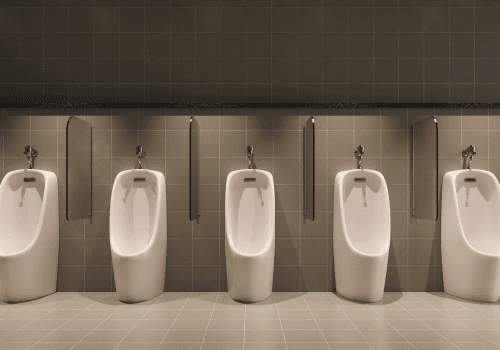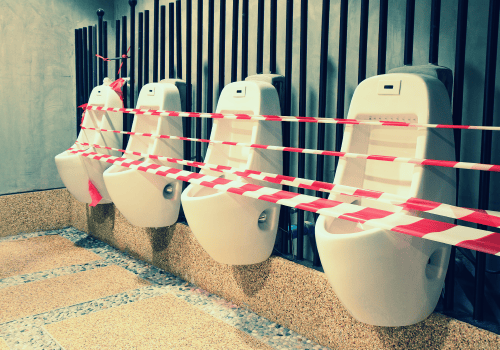Urinals are a vital component of commercial and public washrooms, but they are prone to blockages if not properly maintained. A blocked urinal can cause unpleasant odours, hygiene concerns, and even costly repairs. This could influence visitors to your business to associate the state of your lavatories with your own work ethic: If your toilets don’t even work, how must this reflect your work? Understanding the main causes of urinal blockages and implementing preventative measures can help keep your washroom facilities in optimal condition. However, when blockages become severe, professional assistance may be required.

What Causes Urinal Blockages?
What Causes Urinal Blockages?
One of the most common causes of urinal blockages is a build-up of uric scale. When urine flows through the pipes, it leaves behind uric acid deposits that harden over time. This chalky substance restricts water flow and can eventually lead to a complete blockage. The longer it’s left untreated, the harder it becomes to remove.
Urinals are sometimes misused and some people can dispose of waste items such as chewing gum or paper towels. These can become lodged in the drainage system, leading to significant blockages that cannot be cleared with standard cleaning methods.
In areas with hard water, minerals like calcium and magnesium can accumulate inside urinal pipes. These mineral deposits mix with uric scale, accelerating blockages and making the drains even less efficient.
Proper flushing is also essential to prevent residue build-up. If urinals are not flushed frequently, or if they have low-flow mechanisms that don’t clear away waste effectively, uric acid and other residues can accumulate, increasing the risk of blockages.
How to Prevent Urinal Blockages
How to Prevent Urinal Blockages
Routine cleaning and maintenance with the right products can dissolve uric scale before it becomes a problem. Enzymatic cleaning agents are particularly effective in breaking down organic matter, keeping pipes clear and free-flowing.
Encouraging proper urinal use can prevent many blockages also. Providing bins and signage reminding users not to dispose of foreign objects in urinals can significantly reduce the risk of clogs.
If your premises are in a hard water area, installing a water softening system can reduce mineral deposit build-up in pipes, prolonging the life of your drainage system indefinitely. Automatic flush will also ensure urinals are properly cleaned out at regular intervals in between cleaning staff shifts; this prevents urine residue from lingering and forming uric scale.
Routine inspections by a drainage specialist can identify early signs of blockages before they become major issues. A preventative maintenance plan will save time and money in the long run.

Indications of Blockages
Indications of Blockages
Despite regular maintenance, some cases will require urinal unblocking by professionals. You should notify drainage experts like Grey-Water if you notice slow-draining, unpleasant odours, water backing up or overflowing, or frequent blockages despite cleaning efforts and use of urinal unblocking chemicals.
We provide fast and efficient unblocking for your commercial premises. Leaving these things unchecked can sour the reputation of your business, cause anxiety and even disease. If you’re dealing with a stubborn uric scale build-up or a complete drainage system breakdown, our team is equipped with industrial urinal drain unblocker, equipment built for reaching further into drain systems and seeing what the root cause is, and a wealth of training backed by years of experience.
Prevention is always the best approach, but when blockages do occur, you need a reliable and professional service to resolve the issue quickly. Contact Grey-Water Drainage Solutions today for expert urinal unblocking and drainage maintenance services.

